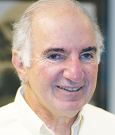The American Society of Hematology (ASH) will honor Alfred Goldberg, PhD, of Harvard Medical School, and Paul Richardson, MD, of Dana-Farber Cancer Institute, with the 2015 Ernest Beutler Lecture and Prize for their significant research advances in the area of proteasome inhibitors and their development as novel therapies for multiple myeloma.
The Ernest Beutler Lecture, named for the late Ernest Beutler, MD, Past President of ASH, is a two-part lectureship that recognizes major translational advances related to a single topic. The award honors two individuals, one who has enabled advances in basic science and another for achievements in clinical science or translational research.
Drs. Goldberg and Richardson will present their lecture, “Understanding the Proteasome: From Protein Degradation to Disease Therapy,” on Monday, December 7, at the 57th ASH Annual Meeting and Exposition in Orlando, Florida. The lecture will be moderated by Kenneth C. Anderson, MD, Director of the Lebow Institute of Myeloma Therapeutics and Jerome Lipper Myeloma Center at Dana-Farber Cancer Institute and a recognized leader in the area of multiple myeloma.
During their lecture, Dr. Goldberg will address the proteasome’s unusual mechanisms, critical functions, and the preclinical development of the proteasome inhibitors, which are now widely used in the clinic and as research tools in cell biology and immunology. Dr. Richardson will focus on the clinical development of proteasome inhibition for the therapy of relapsed and refractory multiple myeloma and its rapid integration into initial treatment as well as maintenance therapy and consolidation.
Alfred Goldberg, PhD
Dr. Goldberg is Professor of Cell Biology at Harvard Medical School. He earned his doctorate in physiology from Harvard University.
Dr. Goldberg’s major discoveries are related to the mechanisms and physiological regulation of protein breakdown in cells and the importance of this process in human disease. His laboratory first discovered the ATP-dependent system for protein breakdown, now termed the ubiquitin-proteasome pathway. After identifying and characterizing the proteasome, Dr. Goldberg’s lab was the first to demonstrate that its function in cells can be inhibited with small molecules, initiating the research effort that led to the development of bortezomib (Velcade), a proteasome inhibitor now commonly used to treat multiple myeloma. Dr. Goldberg’s current work is focused on the regulation of proteasome function and its roles in eliminating misfolded proteins that cause neurodenerative disease and the excessive protein in immune recognition.
Dr. Goldberg is among the top 1% of the most highly cited researchers in the life sciences. He is an elected member of the National Academy of Sciences and the American Academy of Arts and Sciences, and is a fellow of the American Association for the Advancement of Science.
Paul Richardson, MD
Dr. Richardson is Clinical Program Leader and Director of Clinical Research at the Jerome Lipper Multiple Myeloma Center at Dana-Farber Cancer Institute and the R.J. Corman Professor of Medicine at Harvard Medical School. He earned his medical degree at the Medical College of St. Bartholomew’s Hospital, University of London, and completed Internal Medicine residencies at Beth Israel Deaconess Medical Center and the St. Bartholomew’s, Newcastle General, Freeman, and the Royal Marsden Hospitals. He completed fellowships in hematology and oncology at Baystate Medical Center, Tufts University School of Medicine, and Dana-Farber before joining the Dana-Farber Department of Medical Oncology.
Dr. Richardson is renowned for his translational research on small molecules as novel treatments for multiple myeloma and has been integral in the development of new drugs in the field, most notably bortezomib, lenalidomide (Revlimid), pomalidomide (Pomalyst), and panobinostat (Farydak), as well as the next-generation proteasome inhibitors ixazomib and marizomib. His work has established lenalidomide, bortezomib, and dexamethasone as a new treatment standard for both newly diagnosed patients and those with relapsed or refractory myeloma. Most recently, his areas of clinical innovation have included the development of breakthrough monoclonal antibodies including elotuzumab and daratumumab for the treatment of myeloma. His research has also focused on regimen-related toxicity, including treatment-emergent neuropathy in myeloma and the development of defibrotide to treat hepatic veno-occlusive disease complicating stem cell transplantation. ■



